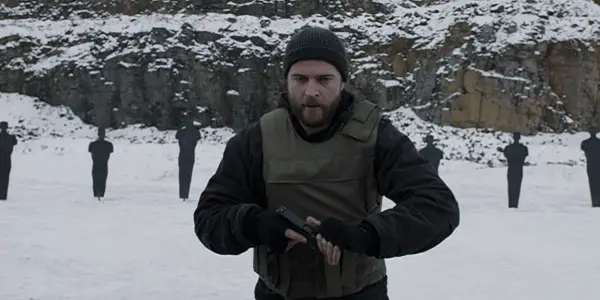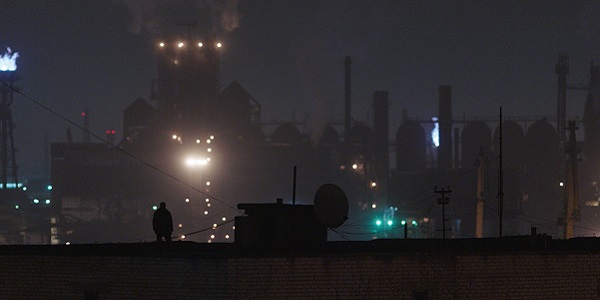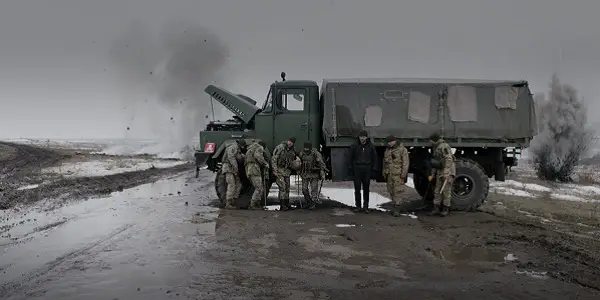ATLANTIS: A Post-Apocalyptic Misfire

Lee Jutton has directed short films starring a killer toaster,…
Ukraine’s submission for Best International Feature Film at the upcoming Academy Awards is Atlantis, a tale of trauma and recovery set in a country attempting to rebuild after being ravaged by war. Written, directed, shot, and edited by filmmaker Valentyn Vasyanovych, the film follows one veteran as he tries to overcome the horrors of the past despite being surrounded by reminders in the present. Yet despite some artistic merit and admirable intentions, Atlantis left me as cold as the barren Ukrainian plains depicted in the film.
The End of Everything
It is the year 2025, one year since the end of a brutal war between Russia and Ukraine. Ukraine has emerged victorious, but not without paying a heavy cost. Much of the eastern part of the country has been left uninhabitable, a desert riddled with forgotten mines and corpses left to rot where they fell.
Sergiy (Andriy Rymaruk) fought in the war alongside his good friend Ivan (Vasyl Antoniak), and both are suffering from shellshock. When not working thankless jobs at a local smelter where they are looked down upon for having fought in the war, they spend their free time firing over and over again at man-shaped targets, longing to regain some sort of purpose in their lives.

One day, Ivan ends his life at work. Soon after, the smelter closes, with Sergiy, Ivan, and other veterans of the war carrying the brunt of the blame. Fed up and looking to start anew, Sergiy heads to the Crimea, the heart of the devastation, where he has heard they’re looking for men to help rebuild that ruined world. There, he meets Katya (Liudmyla Bileka), a young woman with a background in archaeology who now volunteers with a group dedicated to exhuming the corpses of those who died in the war and piecing together what happened to them. By joining Katya and her fellow volunteers in this work, Sergiy finds a new reason to keep living. And soon, he also falls in love.
Empty Shells
Atlantis is a visually striking film composed almost entirely of static wide shots, in which the action (or lack thereof) often continues for minutes without a cut. In one particularly powerful scene, we watch Sergiy go out onto the balcony of his bleak little apartment to bring in the laundry for ironing. What starts as a peaceful, albeit lonely, little sequence of dry domestic life eventually spirals into violence, as Sergiy’s frustration with the iron leads him to smash first the tool, then the table, then his chair, until his barely furnished apartment is cluttered in the detritus of his outburst. It’s a painfully perfect portrayal of hyper-masculine anger, with an undercurrent of deep grief that cannot find an outlet for expression in any other way.

However, not every scene shot this way, no matter how beautifully composed, has the same impact, and in many instances, the film ends up feeling like more of a technical exercise than an emotional one. Watching Atlantis, I was reminded of another film from the former USSR that appeared on the festival circuit this year, Georgian filmmaker Dea Kulumbegashvili’s debut drama Beginning. Like Atlantis, Beginning is composed almost entirely of lengthy wide shots in which the camera remains motionless, a silent and static participant in the action as characters move in and out of frame.
The cinematography style in Beginning never feels gimmicky but does an excellent job at helping articulate the emotional journey of the film’s main character, the wife of a Jehovah’s Witness who is a victim of horrific prejudice and physical violence. Like Sergiy in Atlantis, she too has deep reserves of grief and trauma that need an outlet for expression, and a feeling of loneliness that is further emphasized by the often distant placement of the camera. Yet where Beginning’s cinematography feels designed to serve the story, in Atlantis I was often left with the opposite feeling, that scenes were created to serve the shooting style, designed to look cool at the exception of everything else.

While this is highly unlikely, the feeling that I was watching a film in which more care was given to the style than the substance did not dissipate while I was watching Atlantis. For instance, there are multiple scenes in the film in which bodies are exhumed and detailed autopsies carried out that drag on for many minutes. Perhaps this was done in an attempt to highlight the emotional distance that humans often try to place between themselves and war, viewing the dead as objects to analyze as opposed to people to mourn in an effort to keep our own trauma buried deep down — an admirable idea to try and get across on screen, to be sure. Yet I didn’t find myself feeling that way during those scenes; rather, I found myself wondering if I was supposed to be feeling that way. Indeed, I spent more time watching Atlantis wondering what I was supposed to be feeling than actually feeling anything at all, enjoying the elegantly composed shots (for the record, there are only 28 in total) while wondering if that was all the film had to offer.
Perhaps this is partially my own fault; perhaps the reason I find a film like Beginning so much more effective than Atlantis is that it is the story of a woman, told by a woman, and I automatically find that more relatable and engaging than this very masculine tale of post-apocalyptic romance and redemption. Yet even the love story in Atlantis felt like an afterthought to me, with Katya existing more as a way to facilitate Sergiy’s reconnection with the world than as a character in her own right. When the two make love towards the end of the film, in yet another scene shot from a distance, this time in the back of a dark truck, it felt more like two bored people filling the time while waiting for a tow to arrive than the emotional apex of Sergiy’s story.
Conclusion
In the lead-up to that moment between Sergiy and Katya, there is a slow tracking shot towards the truck’s windshield in the pounding rain, as the water first blurs and then erases the two figures in the front seat as they lean in to kiss, and it’s one of the most gorgeous things I’ve seen on screen this year. But unfortunately, as Atlantis shows us, it takes more than a few stellar shots to make a character’s journey compelling.
What do you think? What are some of your favorite post-apocalyptic movies? Share your thoughts in the comments below.
Atlantis is screening exclusively through Metrograph starting January 22, 2021 before expanding to other virtual cinemas.
Watch Atlantis
Does content like this matter to you?
Become a Member and support film journalism. Unlock access to all of Film Inquiry`s great articles. Join a community of like-minded readers who are passionate about cinema - get access to our private members Network, give back to independent filmmakers, and more.
Lee Jutton has directed short films starring a killer toaster, a killer Christmas tree, and a not-killer leopard. Her writing has appeared in publications such as Film School Rejects, Bitch: A Feminist Response to Pop Culture, Bitch Flicks, TV Fanatic, and Just Press Play. When not watching, making, or writing about films, she can usually be found on Twitter obsessing over soccer, BTS, and her cat.












